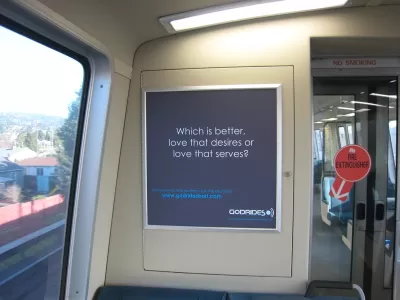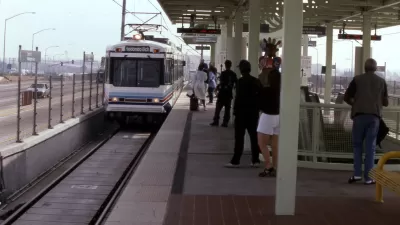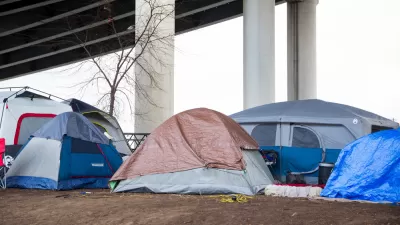BART won big on election night with the passage of Measure RR, a $3.5 billion infrastructure bond measure. But the San Francisco Chronicle observes that results from two other local ballot measures suggest a mixed message on the rapid transit system.

Take a ride on BART with the San Francisco Mayor Ed Lee, Oakland Mayor Libby Schaaf, and San Jose Mayor Sam Liccardo as they tout Measure RR to fellow passengers, cheek by jowl.
Voters clearly showed their support for the $3.5 billion Bay Area Rapid Transit (BART) District property tax measure, which comfortably exceeded the two-thirds threshold to pass, winning 70.07 percent of the vote region-wide. However, the vote wasn't uniform in the three BART District counties:
- The measure passed overwhelmingly in San Francisco County with 81.32% voting yes.
- In Alameda County, 71.31% voted yes.
- But it failed to meet the two-thirds threshold in Contra Costa County, where it received 59.67
"The battle over Measure RR was contentious, though few familiar with BART would dispute the need to rejuvenate and modernize the rail transit system, whose trains carry an average of more than 430,000 passengers each weekday," wrote Michael Cabanatuan, reporting on the victory of the measure on Nov. 8 for the San Francisco Chronicle. It has the nation's fifth highest ridership among U.S. rapid transit systems.
BART officials and other Measure RR backers argued that it was simply time for an overhaul of the system, at a cost they estimated at $9.6 billion. With state and federal funding drying up, they argued, property owners in the district need to step in.
And that they did, to the relief of the elected BART Board of Directors, though the same voters ousted two incumbent directors of the 9-member board. Voters did not heed The Mercury News which strongly editorialized against Measure RR.
In addition, Santa Clara County, which is not part of the BART District but is paying for an extension to San Jose and Santa Clara, "said yes to Measure B, a half-percent sales tax that will raise $6.3 billion for transportation over 30 years," notes the San Francisco Chronicle editorial. "About $1.5 billion of that will go toward a BART extension into the county."
And here's the mixed message the paper observes: In effect, voters said 'yes' to only one BART tax per county.
San Francisco and Contra Costa County, meanwhile, said no to sales tax measures that would have paid for a [BART] rail-car fleet expansion. Measure X in Contra Costa County fell just short of the two-thirds approval threshold it needed for passage. In San Francisco, Prop. K failed to earn even a simple majority of voters.
Since revenue from Prop. K would have gone to the general fund, as opposed to a specific fund, it needed only a majority vote for passage. Over 65% of voters rejected it. Revenue would have been used to fund the Prop. J to provide additional homeless services as well as transit needs.
In Contra Costa Costa County, $300 million of Measure X, a 30-year, half-cent sales tax measure, "was earmarked for making improvements to the BART system in the county, including the purchase of new train cars, parking improvements and station enhancements," reported California Patch.
Voters in Alameda and Contra Costa Counties also overwhelmingly approved Measure C1, the Alameda-Contra Costa Transit District Parcel Tax Extension. "The $30 million per year that the parcel tax generates will be used to support basic bus operations and maintenance, according to AC Transit.
Related Planetizen coverage:
- The San Francisco Bay Area Voted for a Sustainable, Inclusive Future, November 26, 2016
- FEATURE: Election Roundup: Planning's Big Day at the Ballot Box, November 9, 2016
FULL STORY: Bay Area voters say yes to 1 BART tax per ballot

Maui's Vacation Rental Debate Turns Ugly
Verbal attacks, misinformation campaigns and fistfights plague a high-stakes debate to convert thousands of vacation rentals into long-term housing.

Planetizen Federal Action Tracker
A weekly monitor of how Trump’s orders and actions are impacting planners and planning in America.

San Francisco Suspends Traffic Calming Amidst Record Deaths
Citing “a challenging fiscal landscape,” the city will cease the program on the heels of 42 traffic deaths, including 24 pedestrians.

Adaptive Reuse Will Create Housing in a Suburban Texas Strip Mall
A developer is reimagining a strip mall property as a mixed-use complex with housing and retail.

Study: Anti-Homelessness Laws Don’t Work
Research shows that punitive measures that criminalized unhoused people don’t help reduce homelessness.

In U.S., Urban Gondolas Face Uphill Battle
Cities in Latin America and Europe have embraced aerial transitways — AKA gondolas — as sustainable, convenient urban transport, especially in tricky geographies. American cities have yet to catch up.
Urban Design for Planners 1: Software Tools
This six-course series explores essential urban design concepts using open source software and equips planners with the tools they need to participate fully in the urban design process.
Planning for Universal Design
Learn the tools for implementing Universal Design in planning regulations.
Heyer Gruel & Associates PA
JM Goldson LLC
Custer County Colorado
City of Camden Redevelopment Agency
City of Astoria
Transportation Research & Education Center (TREC) at Portland State University
Jefferson Parish Government
Camden Redevelopment Agency
City of Claremont




























